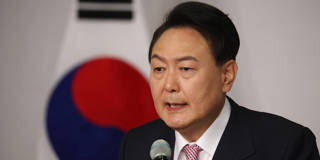Under President Yoon Suk-yeol, South Korea is adapting to a rapidly changing geopolitical environment by seeking to elevate its international profile and improve relations with key allies. But sustaining this important strategic shift will require its deeper institutionalization, both at home and in the US and Japan.
SEOUL – The geopolitical terrain in Northeast Asia is shifting, and, fortunately, the region’s two great democracies, Japan and South Korea, are moving in a similar direction. If prudent, strategic leadership prevails in both Tokyo and Seoul, the two countries’ historical enmity may finally be consigned to the past, and security across the Indo-Pacific region will be enhanced.
The catalyst for reducing the bilateral diplomatic friction – a problem that dates to the pre-World War II era– was Yoon Suk-yeol’s (no relation) inauguration as president of the Republic of Korea last May. With Yoon’s arrival in the presidential office, the pursuit of a chimerical “balance” in relations with China and the United States – previously a central focus of South Korea’s foreign policy – has given way to a more clear-eyed assessment of the country’s security needs.
Russia’s invasion of Ukraine was a rude awakening for Yoon, and for many South Koreans across the political spectrum. With China and others effectively backing Russian President Vladimir Putin’s criminal behavior, the war has called into question the entire international security architecture. Add the mounting North Korean nuclear threat, the intensifying Sino-American rivalry, and the risk that China will mimic Russia’s invasion with a similar move against Taiwan, and Yoon had more than enough evidence that South Korean national security requires closer ties with both the US and Japan.

SEOUL – The geopolitical terrain in Northeast Asia is shifting, and, fortunately, the region’s two great democracies, Japan and South Korea, are moving in a similar direction. If prudent, strategic leadership prevails in both Tokyo and Seoul, the two countries’ historical enmity may finally be consigned to the past, and security across the Indo-Pacific region will be enhanced.
The catalyst for reducing the bilateral diplomatic friction – a problem that dates to the pre-World War II era– was Yoon Suk-yeol’s (no relation) inauguration as president of the Republic of Korea last May. With Yoon’s arrival in the presidential office, the pursuit of a chimerical “balance” in relations with China and the United States – previously a central focus of South Korea’s foreign policy – has given way to a more clear-eyed assessment of the country’s security needs.
Russia’s invasion of Ukraine was a rude awakening for Yoon, and for many South Koreans across the political spectrum. With China and others effectively backing Russian President Vladimir Putin’s criminal behavior, the war has called into question the entire international security architecture. Add the mounting North Korean nuclear threat, the intensifying Sino-American rivalry, and the risk that China will mimic Russia’s invasion with a similar move against Taiwan, and Yoon had more than enough evidence that South Korean national security requires closer ties with both the US and Japan.